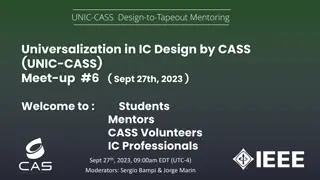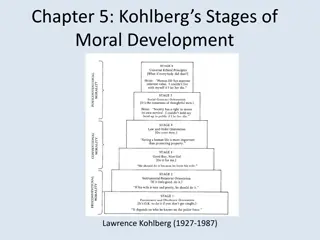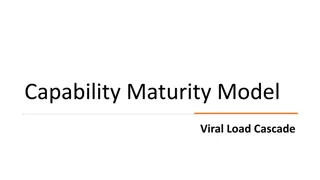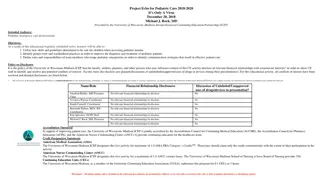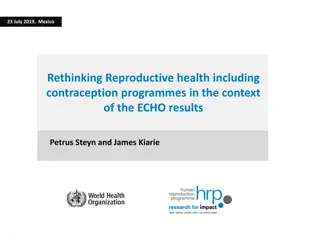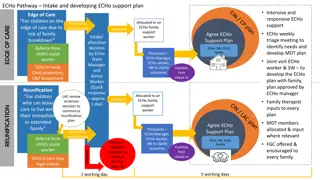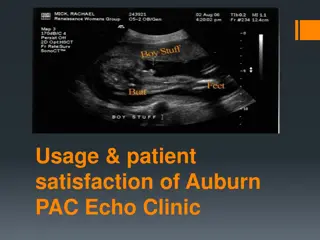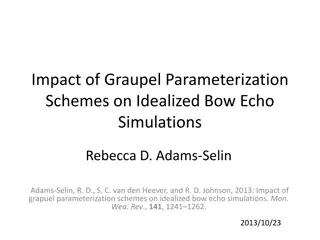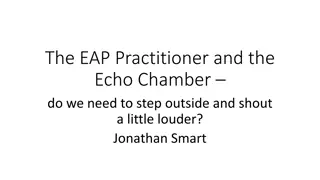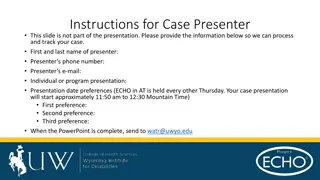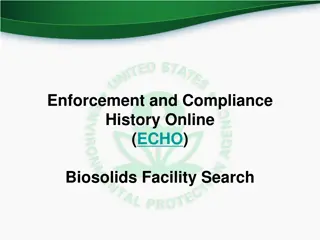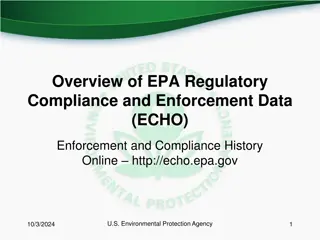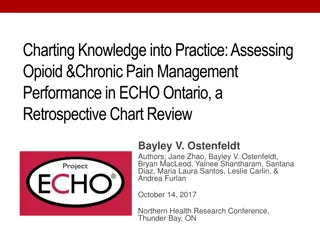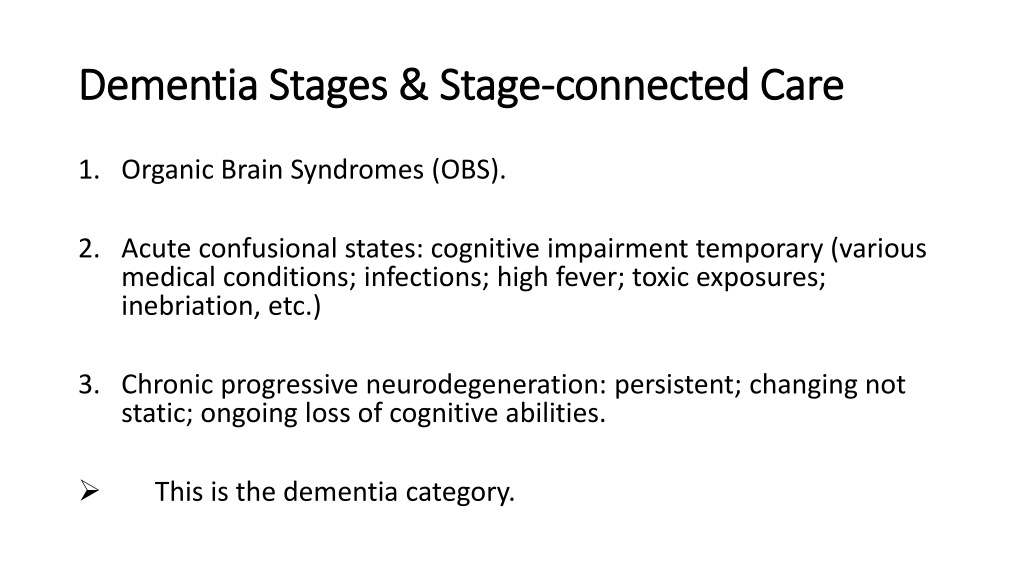
Understand the Stages of Dementia and Caregiver Actions
Explore the stages of dementia, including pre-dementia and dementia stages, and learn about the importance of caregiver actions based on the Savvy Caregiver approach. Discover the main theme for staging dementias and the benefits of caregiver education in managing behavior problems.
Download Presentation

Please find below an Image/Link to download the presentation.
The content on the website is provided AS IS for your information and personal use only. It may not be sold, licensed, or shared on other websites without obtaining consent from the author. Download presentation by click this link. If you encounter any issues during the download, it is possible that the publisher has removed the file from their server.
E N D
Presentation Transcript
Dementia Stages & Stage Dementia Stages & Stage- -connected Care connected Care 1. Organic Brain Syndromes (OBS). 2. Acute confusional states: cognitive impairment temporary (various medical conditions; infections; high fever; toxic exposures; inebriation, etc.) 3. Chronic progressive neurodegeneration: persistent; changing not static; ongoing loss of cognitive abilities. This is the dementia category.
Several questions to address about stages Several questions to address about stages 1. Are there stages of dementia? 2. How many stages? 3. How to define each stage? 4. Why know what stage?
Note: Stages and caregiver actions to follow are based on the Savvy Caregiver approach. 1. Savvy Caregiver, Ken Hepburn, principal author. 2. Savvy Caregiver for Indian Country, J. Neil Henderson, principal author. 3. Today s information uses the Claire Allen staging protocol with examples of caregiver action as if the affected person is involved with a daily meal preparation. 4. Caregiver education & support is compensatory reablement for the PWD and benefits the caregivers as invisible second participants.
Main theme for staging the dementias: Main theme for staging the dementias: 1. Productive caregiving responses are optimized when the complexity of care matches the affected person s ability to understand and perform. 2. Desired result: CONTENTED INVOLVEMENT. 3. Affected person feels secure; protected; loved. 4. Caregivers feel a sense of accomplishment in the face of difficult and sad matters.
Benefits for caregiving when the caregiver is Benefits for caregiving when the caregiver is dementia dementia- -educated. educated. 1. As caregiver expertise increases, behavior problems decrease. 2. Keeping in mind that most behavior problems are forms of communication.
Are there exact stages of dementia? Are there exact stages of dementia? https://www.alzinfo.org/understand-alzheimers/clinical-stages-of- alzheimers/#:~:text=This%20guideline%20is%20used%20by,no%20longer%20live%20without%20assistance. 1. The seven Clinical Stages of Alzheimer s disease, also known as the Global Deterioration Scale (GDS), was developed by Dr. Barry Reisberg, Director of the Fisher Alzheimer s Disease Education and Research program at NYU Grossman School of Medicine. 2. This guideline is used by professionals and caregivers around the world to identify at what stage of the disease a person is in. 3. Stages 1-3 are the pre-dementia stages; 4. Stages 4-7 are the dementia stages. Stage 5 is the point where a person can no longer live without assistance. 5. Stage 6 has 5 subparts, 6. Stage 7 has 6 subparts. So, a total of 16 stages.
Are there exact stages of dementia? Are there exact stages of dementia? https://www.alz.org/alzheimers-dementia/stages Alzheimer s Association: Early, Middle, Late = Mild, Moderate, Severe.
Are there exact stages of dementia? Are there exact stages of dementia? https://www.mayoclinic.org/diseases-conditions/alzheimers-disease/in-depth/alzheimers-stages/art-20048448 1.Mayo Clinic: 5 stages. 2.Preclinical Alzheimer's disease. 3.Mild cognitive impairment due to Alzheimer's disease. 4.Mild dementia due to Alzheimer's disease. 5.Moderate dementia due to Alzheimer's disease. 6.Severe dementia due to Alzheimer's disease.
Are there exact stages of dementia? Are there exact stages of dementia? https://www.pennmedicine.org/updates/blogs/neuroscience-blog/2019/november/stages-of-alzheimers Penn Medicine: 7 but not the Reisberg version. The timing and severity may be different for each person, and it can be difficult to determine which stage your loved one is in because stages may overlap and are only meant to be a guideline. 1. Stage 1: Before Symptoms Appear 2. Stage 2: Basic Forgetfulness 3. Stage 3: Noticeable Memory Difficulties 4. Stage 4: More Than Memory Loss 5. Stage 5: Decreased Independence 6. Stage 6: Severe Symptoms 7. Stage 7: Lack of Physical Control
Are there exact stages of dementia? No. Are there exact stages of dementia? No. 1. There are not discrete, clearly bounded changes from one state to another. 2. Of course, there are changes from start to finish. 3. More like an idiosyncratic, unstable, continuum of decline. 4. Stages are heuristic devices: they assist in organizing our thoughts and subsequent actions. 5. We will use the Allen 6 Stages from the Savvy Caregiver approach.
Meal Preparation: Allen Stage 5 (Early) Structure & Support Factors 1. Can do task involving moving about the home. 2. Can do 4-5 step tasks. 3. Can keep purpose of task in mind. 4. CG should give clear verbal direction. Stage-connected tasks 1. Arranging the meal table/area. 2. Measuring and mixing things together. 3. Taking things to the table. 4. Helping to cook.
Meal preparation: Allen Stage 4.5 (Early Meal preparation: Allen Stage 4.5 (Early- - Middle) Middle) Structure & Support Factors 1. Should be able to do 3-5 step tasks. 2. Will likely keep the purpose of task in mind. 3. CG provide clear verbal direction. 4. May have to remind about the task or its parts to completion. Stage-connected tasks 1. Getting things from other areas. 2. Arranging an area. 3. Taking things to the table and returning things to the kitchen. 4. Measuring and mixing. 5. Sweeping around the meal area. 6. Doing/drying dishes. 7. Helping to cook/make sandwiches.
Meal Preparation: Allen Stage 4.0 (still Early Middle) Structure & Support Factors 1. Needs a contained area for tasks (e.g., dining room; kitchen, etc.). 2. Can do 2-4 step task; repetitive routine good. 3. Place materials needed at the site. 4. Give directions + visual demonstration; help start task; show end goal if possible. 5. Check on them; remind; correct in a positive way. Stage-connected tasks 1. Place silverware & condiments on table. 2. Make sandwiches. 3. Put food in containers. 4. Prep string beans; shell peas. 5. Place napkins/tablecloth. 6. Place water/juice on table. 7. Place flowers on table.
Meal preparation: Allen Stage 3.5 (Late Middle) Structure & Support Factors 1. Sit down task + in reach. 2. Can do 1-3 step task. 3. Needs reminders & may not recall purpose of task. 4. Demonstrate visual; help to start. 5. Needs frequent checks to stay on task. Stage-connected tasks 1. Wrap silverware in napkins. 2. Put flowers into vases. 3. Peeling, shredding, chipping, and dicing. 4. Stirring/rolling cookie dough. 5. Cracking eggs in bowl. 6. Buttering toast.
Meal preparation: Allen Stage 3.0 (still Late Middle) Structure and Support Factors 1. May be able to do 1-2 step tasks. Stage-connected tasks 1. Rolling dough for cookies. 2. Folding napkins (in half). 2. Don t worry about quality. 3. Stirring. 3. Involvement is most important.
Meal preparation: Allen Stage 2 (Late) Structure & support factors 1. Likely can only enjoy passive (e.g., being in the room of an activity; listening to music; select movies, etc.). Stage-connected tasks 1. Wiping surface in front of them. 2. Spreading butter on bread if butter already placed on bread. 2. May be able to do 1 step, if simple.
Meal preparation: Allen Stage 1: End stage Structure & support 1. Palliative care. Stage-connected tasks 1. Keep pleasant environment (e.g., soothing music; the hum of daily activities; conversation directed to them (even if no observable response). 2. Bed & body care (clean sheets; skin care; incontinence care. 2. End of life care. 3. Hospice care. 3. Hydration and nutrition.
Summary Summary 1. Staging is imposed on a natural and difficult to predict decline of function. 2. Staging helps to develop corresponding types of communication and intervention that will be optimally responded to by the PWD. 3. Caregiver action that fits the PWD s capabilities will induce more times of contented involvement than caregiving without of plan. 4. Caregivers, the PWD, and the caregiving network will benefit from less emotional stress, more sense of accomplishment in responding to a chronic condition, and a more harmonious household.
Resources 1. Brodaty H., Donkin M. Family caregivers of people with dementia. Dialogues Clin Neurosci. 2009;11:217 228. 2. Alzheimers & Dementis: Tranlational Research & Clinical Interventions. 2017 Sep; 3(3): 450 458. 3. The effects of caregiver characteristics on behavioral and psychological symptoms of dementia of patients with dementia. PC Lin, HT Lin, YH Yang, YH Yang - Aging & Mental Health, 2022 - Taylor & Francis. 4. Facilitators and barriers for families caring for adults living with Alzheimer's dementia: A qualitative study. MS Lotfi, FM Shahboulaghi, RA Jablonski, A Ebadi - Geriatric Nursing, 2022 Elsevier.



